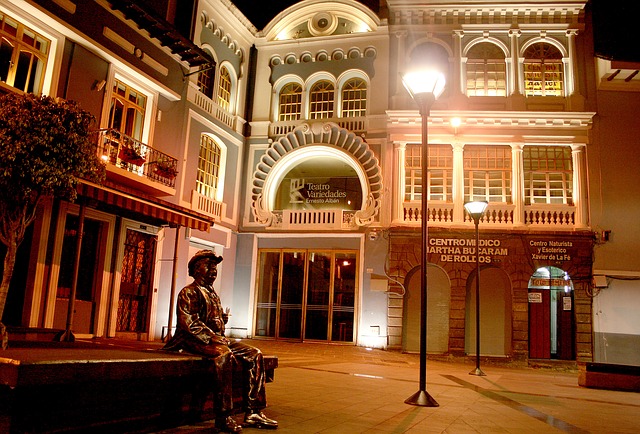Health, Safety, and Romance in Chile: Travelers Tips from Maggie

Health, Safety, and Romance in Chile: Travelers Tips from Maggie
After globe-trotting for a year, Maggie Dickman settled in Santiago, Chile long enough to earn an English teaching certificate. She then moved to Chile and taught English there for two years. Here, she shares her insider tips on health, safety, and romance in Chile.
Health in Chile
Feminine Hygienic Products: What’s available/what’s legal/where to buy them?
Sanitary pads are more readily available than tampons, but tampons can be found as well, though the different absorption types can be difficult. All pharmacies sell feminine hygiene products as well as some grocery stores. I’ve never found the applicator-free tampons like “O.b.” in Chile.
Birth Control: What’s available/what’s legal/where to buy them?
Most local pharmacies will sell you birth control over the counter if you come in prepared with a specific brand name. The chain pharmacy Cruz Verde sometimes asks for a prescription, but most don’t. Other birth control methods like condoms can be bought in any pharmacy or grocery store. They are often locked up, though.
Gynecologists: Are there any that you recommend? How, if at all, is a visit different from at home?
I’ve never had to see a gynecologist, but I think the pubic hospitals provide gynecological services. There is a big expat community in Santiago, and there are a variety of helpful groups on Facebook like “The Chile Experience” which provide a hive mind mentality for finding services such as this.
Breastfeeding: What are accepted places for women to breastfeed? Is it accepted to do so in public?
Women can breastfeed wherever they are comfortable doing it. Occasionally they’ll be shot a disgusted look from a passerby, but for the most part it’s not even given a second glance.
Romance in Chile
Dating Locals: What are the norms and traditions? What should women look out for?
Chile has one of the highest rates of infidelity in the Americas. For this reason there tends to be a lot of jealousy from both men and women in relationships. This is demonstrated by constant checking up on, in the forms of phone calls/texts, which is followed by anxiety/worry if there’s not an immediate response.
Chileans are also very open about public displays of affection. It’s not uncommon to see couples of all ages and genders making out (and more) in public places like the subway, buses, and park benches.
I like to say that Chileans (Latinos, really) do everything full force. When they are angry, they’re irate. When they are in love, their partners are their whole world and more. Additionally, when they are sad, it’s a tragedy-level waterworks show. There doesn’t tend to be much nuance in Chilean emotions, which carries over to relationships.
Types of Men: Describe a few “typical” types of men.
Latino men are often more sensitive than their Western counterparts. They’ll be more hurt and open about the pain caused over issues that would seem minor in a Western relationship, such as not holding his hand or sitting next to him at a group dinner. This sensitivity is also demonstrated through jealousy, and it’s not uncommon for your boyfriend to be hurt if you often text or go out with male friends. On the flip side, though, the sensitive Latino will generally be in tune with his partner’s needs and wants and be the most attentive lover.
“Machismo” is a common trait among Latino men as well. Note, not *all* Latinos are “machista”, but many of them are. It’s basically a combination of chivalry and chauvinism. The machista will hold the door for you and pay for your dinner, but because he believes women are the weaker sex. Machistas believe that women should stay home to raise children and cook dinner. They are also the men who will catcall women and be genuinely surprised if women get angry about it. They “demand” respect and are often controlling in their relationships.
A third type of “typical” man can fall into any category. Chilean men are usually very close to their mothers. It’s not uncommon for children to live with their parents all through university and then for a few years after that. Because of this close relationship with their mothers, sometimes men expect their girlfriends and wives to be just as doting as their mamas.
LGBTQ-friendly?
Santiago is more LGBTQ-friendly than other parts of Chile. Santiago has a few gay bars and clubs. I’ve witnessed plenty of gay encounters and the locals barely bat an eye, but some of my gay friends say there is still discrimination, particularly among middle-aged Chileans and older.
Chile recognizes same-sex unions, which have some but not all of the same rights as marriage. It has not yet legalized gay marriage, but the current president supports it and activists are trying hard to make it a reality.
Women’s Place in Society in Chile
Women’s Rights: Do women have the same position in society as men? How can you tell?
The only way I’ve noticed a lack of Women’s Rights is through small scale measurements, like in the workplace. Prospective employees are required to include their age, gender, and marital status on their CVs. Chile can legally discriminate against married women at the “age of fertility” because they might become pregnant soon. That said, there’s a better maternity leave available in Chile than in the USA.
Abortion is still illegal in Chile, including in the case of rape or incest. This is a very hot topic, but it doesn’t appear that the law will change any time soon.
Catcalling and sexual harassment is common on the streets of Santiago, particularly directed towards foreign women, but it is usually just verbal. Some women have reported liking the sexual attention while others simply accept it. There is very little recourse for this type of behavior. If a woman reacts with anger, the catcaller is amused that he provoked a reaction and/or found “a feisty one” so to speak. If a woman ignores the catcalling, it sends the message that it is OK to treat women this way.
Local Women: What are some clear cultural differences between you and them?
Jealousy is first thing that comes to mind. I concede that this is a sweeping statement, but in my experience Chilean women tend to be very jealous around other women, especially if they view her as a threat, such as a single woman.
I think in general Chileans, not just women, are pretty standoffish and aloof. They are superficially warm on first impression, saying things like “Yeah! Let’s get together soon!” but they are just platitudes. I’ve found it very difficult to break into the “inner circle” of Chilean friendship, but a Chilean friend is one for life.
Overall, I don’t think Chilean women are that different from Western women except that they might care much more about romance and drama, both fueled by jealousy.
Perception of Foreign Women: How do local men/women react to you when you say where you’re from?
There are a lot of Americans in Santiago, so it’s typically not an issue. Chileans like to argue that people from the USA shouldn’t refer to themselves as “American” because everyone from North and South America are “American”, but this it the most animosity I’ve encountered among Chileans when I say I’m a “gringo”. (Note, “gringo” was originally an offensive term for Americans, but in Chile it’s come to just mean “white person”.)
Safety in Chile
Transportation: Any that are safer/less safe for women to take?
I don’t feel comfortable walking home late at night alone, but all public transportation, including Uber and taxis, has been fine for me.
Dangerous area/s: Any specifically for women?
Some of the poorer areas on Santiago, such as La Pintana and areas west of Estacion Central, could pose a minor threat, but most places where a tourist will be, including Santiago Centro, will be fine, even at night.
Chileans do like to protest, and some of these can get violent. As can football matches. Tear gas is often employed by police in these cases, so it’s advisable to steer clear.
Travel Chile: 8 Things to Know by Grace
I am so happy to have pushed myself to volunteer in Chile before turning 30. Now, my New Year’s Resolution is to figure out how to utilize what I have learned from my experience teaching abroad to continue to foster my interests in cultures, people, languages, learning, teaching, and giving back. I also want to share my travel experiences with others to help them go abroad.
If you choose Chile, here are some things you might want to know:
1. Chile is the largest consumer of white bread.
It is eaten with cheese, sliced deli meats, jam, and/or butter for breakfast and “once” (light dinner which can be as early as 5pm or as late as 9pm). Alternatives such as wheat and multi-grain bread/pasta are more readily available now in the supermarkets or bakery chains such as Olfos, but don’t expect to see it in restaurants or in a traditional Chilean home. Also, you may be surprised at how much mayonnaise Chileans eat.
Go check out the mayonnaise aisle when you pass by a major supermarket. If you order a sandwich or burger, tell them “poco mayo” (little mayo) or you may decline eating your sandwich all together.
2. Salads usually consist of 2 or 3 ingredients.
Leafy greens usually consist of lettuce so ask what is available that day if you are looking for a variety of vegetables.
3. Go to the ferias (farmer’s market) for produce.
Here, you can find fresher produce at a bargain.
4. The younger generation of Chileans are more liberal with the introduction of birth control pills in recent years and the morning after pill this year.
The variety of relationships in Chile appear more widely accepted in comparison to in the United States (i.e. one-night stand, friends with benefits, divorced with children but living with a partner, etc.). Divorce is more common now than before.
Don’t be surprised if someone tells you,“So what? You’re not dead!” when they are trying to set you up with a date even though you tell them that you have a boyfriend or husband at home.
5. Buses leaving bus terminals and metros are generally on time.
However, when you are planning to take a bus to another town that may be 1 or more hours away, ask 2-3 locals (not just 1) or the guy who stands on the sidewalk with a clipboard and the bus timesheet when to expect the next “micro” (mini-buses). You could wait up to 2 hours if you’re going to a small town.
6. Chile, in general, is pretty safe for traveling even if you are a female or know little Spanish.
However, some crowded cities such as Santiago Centro and various hills in Valparaiso are known for thievery (i.e. purse snatching, knocking someone down to take their backpack) so it is safer to keep valuable items in zippered or internal pockets and to not carry a large purse.
Health, Safety, and Romance in Chile: Travelers Tips from Maggie
7. If you stay out late at night and you have a choice of taking a “micro” or “collectivo” (shared taxis with set routes), take a collectivo, preferably with a passenger inside already.
Micros are crowded with late night clubbers and you risk getting your purse snatched if you bring one with you.
8. Holiday shopping: There are not as many after-Christmas or New Years sales in Chile as in the United States.
There seems to be better deals online for electronics and larger items. So if you see something that you like before Christmas, get it, because it probably won’t be much cheaper after Christmas.
Health, Safety, and Romance in Chile: Travelers Tips from Maggie
Related Reading
Dating in Chile: A Conversation with Jennifer Ramos
Why Santiago’s La Vega is a Market Like No Other
Chile’s National Holidays: Family, Fondas, and Fun
Why Did I Move to Chile? “¿Por qué no?”
A Long Weekend in Chiloe, Chile
Travel Chile: A Conversation with Rebecca Murphy
Have you traveled to Chile? What were your impressions? Email us at [email protected] for information about sharing your experience and advice with the Pink Pangea community. We can’t wait to hear from you.









Alexandra made a good point. I should add a disclaimer to this post. The answers I gave are based on my personal experiences in Chile. I am by no means an expert in the field or of all things Chilean. Thank you for clearing things up on this matter.
I also want to take this time to extend the disclaimer to my experience with Chileans. I realize that the interview has come across as fairly negative against them. By no means is every Chilean man a machista or is every Chilean woman jealous. There are plenty of lovely native Chilean men and women who will welcome you to their country with open arms. Like I said, a Chilean friend is a friend for life.
Thanks for reading!
Not quite accurate about the abortion part – they are reviewing the law right now, the Chamber of Deputee has approved the bill to legalize abortion in the following cases: when the mother’s life is at risk, when the fetus will not survive the pregnancy, and in the case of rape, as of March 2016, and it is now waiting approval from the Senate.
If you need an abortion you can either go through underground channels (not recommended), or travel to a country where it’s legal (Mexico City for instance).
Also it is important to mention you cannot get emergency contraception unless you are able to obtain a prescription and travel outside Santiago to one of the only three pharmacies that have it, and will be treated as shit and looked down at because, surely to be sexually active is a crime, if you ask for any at pharmacies, which can be triggering.
As of gynecologists since a lot of expats are not on isapre they have to go private ones, which cost 40 lukas. To get blood test to know if you are pregnant some labs charge 20 lukas.
I know it is a blog article, but yeahhh deserves maybe some more insightful research. Don’t hesitate to contact me.